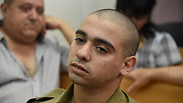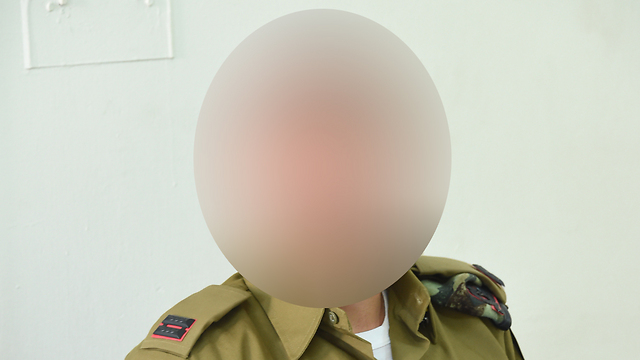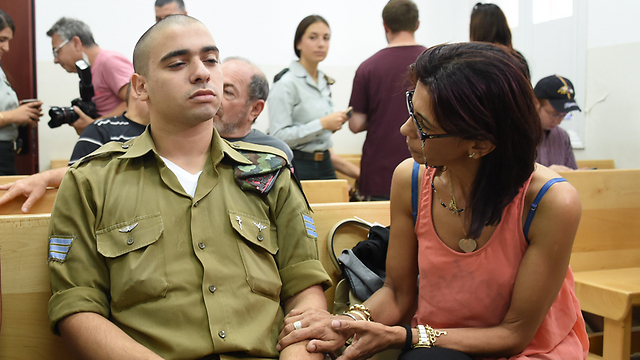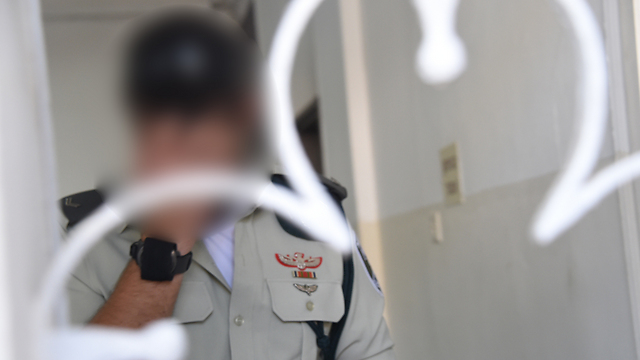
First officer testifies in Elor Azaria's defense
As Sgt. Azaria's defense team summon witnesses to the dock for a second day, Lt. 'M' tells the court that 'there was crazy pressure after the incident. I also instructed my soldiers not to approach terrorist because the sappers had not checked him.'
At the center of Monday’s session was platoon commander from Azaria’s company, who told the court that he did not tend to the terrorist because there was “no clearance from the sappers” who were supposed to ensure that the terrorist was not wearing an explosive belt. “I also instructed my soldiers not to approach the terrorist so as not to endanger their lives,” the witness said. Lt. ‘M’ is the first military official to attest to Azaria’s version of events.
“There was mad pressure after the incident,” the witness continued. “Commanders and soldiers receiving calls from journalists were worried that something happened that wasn’t right. The company commander received instructions from the battalion commander that ever divisional commander discuss the matter with his soldiers and to explain how serious the incident was and to calm the atmosphere. The company, battalion and brigade commanders spoke to us while the military military Criminal Investigation Division (CID) was investigating soldiers. An instruction was given that the chief of staff wanted an investigation until 6am which is where everything started.”
“I looked at the second terrorist who was not killed, I rolled him over and saw that he had a knife in his hand. I distanced everyone from him and placed a soldier there to watch over him. It looked like something was out of proportion—two skinny terrorists and one of them looked ‘big’. I saw a large body on a skinny terrorist and a civilian shouted that there was a bomb. The suspicion was more than reasonable. It created another picture—a frightening picture. All the pieces started coming together and I shouted ‘get away from him. He might have a bomb.’”
Asked whether he believed that the terrorist constituted a life-threatening danger, Lt. ‘M’ replied, “As long as the incident has not finished you cannot say that there is no danger to your life. When terrorist are alive the danger exists. When the terrorist is on the floor that reduces the fear but the danger still exists. We had already had ongoing incidents. In one of them a commander didn’t cordon off the area and then there was a car-ramming attack after the shooting.” He added that “What I experienced in the actual field is different to the evidence provided by the company commander and the battalion commander.”
Lt. ‘M’ was critical of the testimony previously provided by Azaria’s company commaner Maj.Tom Na’aman, as well as his general conduct upon arrival at the scene. “I explained to Tom that I was worried that there was a bomb (on the terrorist) when he arrived at the scene. He didn’t talk much and was on his phone...The management of the area by Tom ignored my fears of a bomb. The only thing he said to me was ‘Put the soldiers here.’ I didn’t feel that Tom took the responsibility as he should have done. As a commander I still felt I had to hand out the orders to our soldiers. The area was not handled well enough. In the month prior to the incident we had not practiced for a bomb scenario.”
Defense Minister Avigdor Lieberman passed comment on the ongoing trial during a tour of Bedouin villages in southern Israel. “It is worth remembering that in the State of Israel, and in all democratic countries, only the court can rule," Lieberman said. "A person is innocent until proven guilty. That includes Elor Azaria and the soldier (who is being questioned over shooting an unarmed Palestinian man). It is worth remembering that people fight each day and each month against terror and terrorists and don’t always have a lawyer by their side when they go on a mission. That is why sometimes the judgement is right and sometimes wrong. But to create a situation in which every soldier needs to request a lawyer before a mission is not possible.
The proceedings were resumed after a month-long moratorium on Sunday when the judge heard testimony from Lt. Col. (res.) Eliyahu Liebman — who has served as the Chief Security Officer in Hebron for the last 22 years — in Azaria’s favor.
In the middle of Sunday's the proceedings, Azaria’s mother, Oshra, began crying out loud, “Where is the justice? Where is the justice?” before leaving the courtroom and being being told by the judge to calm down.
In total, the defense team is expected to summon 25 witnesses to the stand including three currently serving officers and former senior officials.













